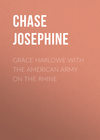Читать книгу: «Marjorie Dean, Post-Graduate», страница 10
CHAPTER XXI. – “GOOD HUNTING”
Warned by her chums that her pretty roommate was more than likely to prove frosty, Muriel went to Room 22, armed with her usual light-hearted insouciance, the best weapon she could have had in the circumstances. Far from being cast down by the chilly environment Doris’s haughty manner merely appealed to her keen sense of the ridiculous. She gaily named her the Ice Queen and their room the ice chest. “If I stayed in the ice chest too long I might catch cold,” she roguishly informed her chums, “but I’m never there more than five minutes at a time except to sleep.”
With the filling up of the campus houses with students and the formal opening of Hamilton College the Travelers found their work cut out for them. They spent countless hours in station duty, welcoming arriving freshmen. Feeling their responsibility as post graduates they tried earnestly to promote a spirit of sociability on the campus. These self-imposed duties, besides the effort to keep in touch with their personal campus friends, kept them constantly occupied.
The very reliable, conscientious firm of Page and Dean had the serious duty before them of looking out for the students who had formerly lived in the now demolished houses of the dormitory site. The tenants of the houses in the block which Leslie Cairns had bought had been ordered out of them directly after Commencement. The dingy row of dwellings still stood, awaiting their chagrined owner’s pleasure. For a time Leslie had lost interest in the garage idea and had regarded her ill-gotten purchase as an elephant on her hands. Later, she had moodily resolved, because she had nothing else to busy her, to go on with her original plan in the hope of being able, eventually, to even what she considered as a “score” with Marjorie Dean.
After painstaking inquiry and investigation Marjorie and Robin had finally found good boarding places in the town of Hamilton for the seventy-two students who could not afford campus rates. The zealous promoters had also arranged with an Italian, who had recently begun operating a three-bus line between Hamilton and West Hamilton to carry the students to the campus every morning on special trip. More, their old friend Baretti had offered to serve such students with sandwiches and tea, coffee or milk whenever their free hours from recitations should permit them to come to the restaurant. The devoted friend of Page and Dean, the warm-hearted Italian had named a small price for the service. He had been an almost avid supporter of the Travelers’ plans and had often hinted that “someday” he would give the “dorm” a nice present.
“Positively, Robin Page,” Marjorie declared fervently one soft fall afternoon as the two girls left the dormitory site after a consultation with Peter Graham, “things are simply skimming along. Everything good seems to be gravitating straight toward us. Thanks to Miss Susanna and Jonas the site is clear now and ready for the building. It wouldn’t have been cleared before Christmas if they hadn’t given us that splendid early start. And where could we find another builder like Mr. Graham? We couldn’t; I’m sure.”
“Blessing number two,” counted Robin, laughing. “We might as well rank Guiseppe Baretti as number three. Think of what he’s done for us!”
“I’m thinking,” Marjorie nodded. “Then that bus line started up like magic. Just what we needed, when we needed it! And the boarding houses for the off campus girls are fine. Now that they are so beautifully settled we can begin to pick up life on the campus. The freshies this year seem a dandy set of girls.”
“So Phil says. She’s not crazy over the sophs, though. She says she thinks they are chesty. Not Gussie Forbes and her crowd. Phil likes Gussie. She says there is a lack of college spirit among the others. She hasn’t discovered why as yet.” Robin looked thoughtful. “I dare say Gussie knows. She is such a live wire.”
“I must have a talk with her. Oh, gracious!” Marjorie sighed audibly. “I have so much to do I hardly know what to tackle first. I can’t start chemistry again for at least another week. That and French poetry are all I shall undertake this semester.”
“I’m going to send for my car,” Robin announced with sudden irrelevancy. “I’ve wasted time waiting for taxis to and from town. We really need my roadster.”
“I’d like to have a car here this year,” Marjorie admitted honestly. “This is a great secret, Robin. I haven’t told another person: General gave me a choice before I came back here between having a car and the money it would cost. I – I took the money. We need it for the dormitory. I know we are welcome to use as much of Ronny’s money as we like, but the self-respecting way is to raise it by earning it, or by self-denial.”
“You old dear!” Robin patted Marjorie’s arm. “You’ve taught all of us the self-denying way. I spent scads of money when first I came to Hamilton. Now I’ve turned positively stingy in my old age. I might as well have my car here as home. No one uses it there. I have an excuse for what the up-keep will cost.”
Robin was full of her plan to send home for her car. She began to calculate, as the two entered the campus and lingered there for a brief talk, on the saving of time it would mean as against the cost of up-keep. While the absorbed promoters stood talking together a group of half a dozen sophomores passed them. The sophs greeted the two girls’ pleasant salutation with a kind of admiring eagerness. Six pairs of bright eyes rested longest on Marjorie, however. One of the girls made a low-voiced remark to the others. There was a concerted shaking of heads as the group passed on.
They had not gone on far when Marjorie said good-bye to Robin and turned her face in the direction of Wayland Hall. The lively murmur of voices close behind her caused her to wheel suddenly. In the next instant a smiling band had surrounded her.
“Oh, Miss Dean, we’ve something special to ask you,” began the leader of the group, a small blue-eyed girl with a round rosy face and deep dimples. “You know the sophs have their election next week. Gussie Forbes is our candidate for president. We want to get up an election parade for her; a regular booster. We’d like to do something quite funny. Could you – would you – ask that awfully clever P. G. Miss Harper to – help – no I don’t mean exactly to help us. All we’d like is a suggestion from you two.”
“We’ve heard about Miss Harper’s wonderful stunts. We know what good shows you and Miss Page got up last year,” interposed a tall girl with a frank, boyish face. “We were going to ask you and Miss Page when we passed, then we were afraid of interrupting your conversation.”
“I wish you had,” Marjorie said with smiling regret. “Miss Page is full of funny, original ideas. I’ll speak to Miss Harper tonight. Why not come over to the Hall tomorrow evening? We can talk it over. Leila will have thought of some good stunt by then.”
“Oh, fine, lovely, great work!” went up from her pleased listeners. “What time shall we come?” asked the little girl who reminded Marjorie of Susan Atwell, one of her Sanford schoolmates.
“Any time after seven, Miss Vernon,” Marjorie said cordially.
The little girl showed pleased dimples at being thus remembered. The smiles of her companions were equally jubilant at the success of their plea. “Thank you, Miss Dean. We’ll surely come,” was Miss Vernon’s grateful acceptance as the sextette took themselves off across the campus after a united murmur of thanks.
“The old calls are beginning to rise again,” Marjorie reflected happily as she neared the Hall. She was reminded of the phrasing of the “Jungle Books,” which she had adored as a child. “It’s good hunting again on the campus. Good hunting all,” she repeated half aloud, “good hunting all who keep the jungle laws.”
CHAPTER XXII. – A “BOOSTER” PARADE
The “booster” parade for Augusta Forbes, candidate for sophomore presidency of at least half the sophomore class, was as ridiculous as its gleeful originators had intended it should be. Two evenings before the sophomore election the paraders issued from the gymnasium at dark, in amazing and flamboyant procession. A stolid drum major, Anna Perry was a triumph. She wore a scarlet cotton flannel uniform, recklessly trimmed in blue, and a high fur hat, contrived from an old squirrel muff. She led the van with a truly wonderful flourish of baton.
The presidential candidate came next in a two-wheeled push cart draped in red, white and blue bunting. Gussie, in an old black frock coat and trousers and a white plug hat which Leila had unearthed from among the Travelers stage properties was a figure of dignity in spite of the occasional sprawling lurch forward she gave in the cart. The cart was energetically motivated by four stalwart servitors. Their very energy made Gussie cling desperately to the rug-covered soap box on which she sat with one hand while she waved an acknowledgment with the other to the uproarious populace.
The vice president had also been selected for push cart honors. This dignitary’s vehicle, however, while draped with equal gorgeousness was smaller and required only two lackeys. Richly attired in a pleated white shirt, fawn knickers, a blue plush smoking jacket and a black silk hat with a dent in one side of it, he sat flat in the bottom of the cart, recklessly distributing smiles and bows.
The treasurer and secretary came next in white flannel tennis trousers, white shoes and white silk blouses. They wore white sports hats wreathed in blue and scarlet, the sophomore colors. Unfortunately for them they had to be content with express wagons. As both candidates were tall they had to sit in their wagons, backs to the willing soph horses, a generous length of limb trailing over the rear end of their conveyances. It was either this, or a certain possibility of kicking their hard-working steeds. The rosy-faced manager of the Forbes’ party rode in a child’s dark blue automobile which she sturdily propelled with both feet, dressed in a plaided knicker suit, sneakers, a boy’s striped sweater and a red and green monkey cap she looked not more than ten years old. Nor could a boy of that age have made more noise.
Behind her came the band, a ten-piece organization composed of one bugle, two accordions, two drums, one cornet, three combs and a hand organ. On each side of the procession walked the torch bearers lighting the impressive pageant with cat-tail torches. The dark-faced organ grinder in an old black velvet coat and blue overalls and fierce outstanding mustache closely resembled Calista Wilmot. He enthusiastically ground out a program of “Suwanee River,” “Annie Laurie,” “Get Out and Get Under,” and “Do You Love Me, Honey?” while the rest of the band accompanied him with deafening zest.
Sauntering along behind this commotion and seemingly quite unruffled by it were no less than Uncle Sam, George Washington and Christopher Columbus. Their appearance on the campus was the signal for shrieks of mirth and they were hailed with the familiarity accorded to old friends. The parade circled Hamilton Hall three times then trailed down the main campus drive and rested there while the band gave an ear-splitting concert.
At the last the push cart detail tired of their hard but honored task and flatly refused to take the candidates a step further. The squabble ended by the squabblers walking off arm in arm toward the gymnasium where the sophs had made ready a spread of cake and ice cream to which anyone on the campus was welcome so long as the eats held out.
“It’s almost safe to say that Gentleman Gus will be friend president,” Jerry declared to Marjorie that night as the two were preparing for sleep. “I understand that she has over half the class with her.”
“Oh, I think she’ll win. I hope so.” Marjorie became suddenly silent. “There are some of the sophs who still blame Gussie for what happened to Alma Hurst and Ida Weir,” she said, after a little. “She was accused of having informed on two members of her class. She didn’t, you know, and so do the rest of us. It was Miss Walbert who betrayed them.”
“Why, old Marvelous Manager, what makes you so emphatic? Heard anything special about Gussie?” Jerry fixed interested eyes on Marjorie.
“Yes; today. Calista told me. Gussie doesn’t know it. The other Bertram girls do. They won’t tell her. She is so proud. They are afraid she’d withdraw from the nomination. They want her to be president because they think she’d make a fine one. Calista says the sophs are beginning to make a fuss over Miss Monroe. A freshie who lives at Acasia House began raving over Miss Monroe the first day she saw her. The very next day she sent her a big box of roses. The story went around the campus and the sophs heard it and began to rush Miss Monroe. She may be nominated at the class meeting Thursday.”
“Maybe,” Jerry conceded. “Still I think Gus has the inside track. The sophs may nominate half a dozen girls, but Gussie will carry off more than half the votes. You see if she doesn’t. Don’t worry about her.”
“You are so cheering, Jeremiah. I did worry about Gussie, for her to hear anything horrid now, when she’s so full of the election, would cut her to the heart.
“Cut it out, Bean, cut out worry, is the valuable advice of Dr. Macy. If you must worry, worry about me. I can’t decide what I ought to study. I’m too highly educated now. My brain rebels against being stuffed any fuller. I’m what you might call wise in my own conceit.”
“You’re a cheerful goose,” was Marjorie’s fond opinion. Nevertheless she wished the eventful sophomore election were the next day instead of the day after.
CHAPTER XXIII. – STICKING IT OUT
“What is the news from the soph’s election, I wonder? Ronny Lynde looked interestedly toward Hamilton Hall where the sophomore class had collected in a deserted recitation room to elect their officers.
“Here comes Muriel. Maybe she has heard echoes of the tumult that writhes within. What are you doing in the sacred corridors of Hamilton Hall?” Marjorie banteringly hailed. “You don’t belong there.” Marjorie and Ronny were passing Hamilton Hall on their way from a recitation in French Prose.
“Mayn’t a mouse peep into a castle?” demanded Muriel. “I happen to be studying Greek, though I may not look it.”
“Greek,” Ronny meditatively repeated. “That might account for some of your strange actions. Things inexplicable are often remarked as being ‘so much Greek.’ I must say – ”
“Don’t say it,” pleaded Muriel. Let me talk. The sophs are making a grand splatter and clatter at their meeting. It sounded almost as though they were engaged in mortal combat.
“I’d love to linger here and get the first news,” Marjorie said with a bright glance into the open doorway of Hamilton Hall. “It’s against P. G. dignity, though. Besides Professor Leonard wishes to see me at four-thirty in the gym. It’s four-twenty-five now.” She consulted her wrist watch. “I’ll leave you two. Of course, if you should decide to wait for the election returns, it wouldn’t be my fault,” she told the two significantly.
“Such consideration for your friends,” Muriel called after her. Marjorie made a derisive little gesture over one shoulder then quickened her step so as not to keep Professor Leonard waiting.
She found him in his office, his desk littered with physical culture programs which he was in process of making.
“So glad to see you, Miss Dean.” He rose and offered her a friendly hand. “Sit down, and let us have one of our old-time inspiriting talks. I was hoping you would come back to the campus. I supposed you would be in Hamilton, at any rate. I wish you would tell me more about the new dormitory. I had no opportunity to talk with you about it last June.”
Marjorie had intended to remain in the professor’s office not more than a few moments. It was more nearly an hour before she rose to say good afternoon. Professor Leonard had strongly urged her to serve again on the sports committee. The energetic instructor had refused to entertain her doubt that the students of the college might prefer the sports committee should be seniors rather than post graduates.
“I can assure you of your eligibility to the committee,” he said earnestly. “Yourself and two seniors, Miss Severn and Miss Moore, we will say, will make my perfect sports committee. However, think the matter over. I wish you to be satisfied. I know you are a very busy young woman. Help me, if you can. I need your judgment and support.”
Marjorie reveled in the comforting inner assurance of work well done as she left the gymnasium and hastened toward Wayland Hall. She had decided before she reached the steps of the Hall, if Phil and Barbara wished very much that she should accept the honor the Professor had offered her, she would do so.
Glancing up at the chimes clock she saw a quarter to six staring her in the face. “Election’s over long ago,” she said to herself. “I’ll have just about ten minutes to drop in on Gussie before dinner.” “Oh, bother,” was her second thought. “Gussie is probably out somewhere being rushed. I’ll stop at her door, anyway.” She hurried into the hall and made a running ascent of the stairs. She rapped repeatedly on Gussie’s door; at first lightly, then with force. Still no one answered.
Going on to her own room she found the door half open and no Jerry in sight. She flung off her hat and long coat and set off for Ronny’s room. The murmur of voices behind the closed door informed her that there someone was at home.
“Gadding again!” exclaimed Jerry as Marjorie walked into the room.
“I know you are, Jeremiah,” Marjorie retorted sweetly. “It’s surprising in you to own to it.”
“I wasn’t speaking of myself. Walking diagonally across the hall from one room to another isn’t gadding. But you – That’s another story.”
“What about the election?” Marjorie made a scornful face at Jerry and turned to Ronny and Muriel. There was excitement in her question. She felt the same anxiety for Gussie that she would have for one of her chums in the same circumstances.
“Gentleman Gus was elected, but there was some sort of fuss,” Muriel replied to the question. “We hung about the steps where we were when you left us. A crowd of sophs came out. Miss Monroe was with them. She was looking quite pleased with herself. She didn’t see me. I mean she pretended she didn’t. The other sophs, there were nine or ten of them, were peeved as could be. They were grumbling and muttering like a mob in a house play.”
“Those sophs had undoubtedly backed Miss Monroe. We knew then she’d lost without having to be told, Muriel was anxious to find out the details so we went into Hamilton Hall to lie in wait for and pounce down upon someone who knew what we didn’t,” supplemented Ronny.
“By then we’d lost all respect for ourselves as P. G.’s,” chuckled Muriel. “We were getting curiouser and curiouser. We did a wary toddle down the corridor toward the room the sophs were in. The door opened and out came Jane Everest. I can’t recall when I’ve so much enjoyed meeting anyone,” she declared waggishly. “Only Jane didn’t know what the fuss was about. It was a hot one, she said between Gussie and some of the sophs we’d seen coming out of the Hall. Only the chairman and the election committee appeared to know what it was over.”
“I’m afraid I know what it was over,” Marjorie spoke with a kind of sad soberness. “You remember what I told you, Jeremiah?”
“Yes. I’m afraid you knew too much, Bean; too much.” Jerry wagged her head with the air of a wiseacre.
Marjorie had to laugh in spite of her perturbation. Ronny and Muriel were eyeing her expectantly, listening for what she might say next.
“It is because of last year – ” Marjorie broke off abruptly as a quick, imperative knock sounded at the door.
Ronny went to the door and opened it. “Oh, Gussie!” she exclaimed. “Come in.”
“No, thank you. I – I – want to see – just Marjorie – no one else.” Gussie’s voice had a husky sound. Her eyelids were suspiciously pink.
“Why, Gussie!” Marjorie who had heard; was at the door with outstretched hands. “What is it, dear?” she asked in a lower tone.
“I must talk with you. A lot of miserable things have happened. I was elected. I don’t want to be president. I don’t know what to do.” Gussie leaned her arm against a side of the open door, dropped her head upon it and burst into tears.
Next moment Marjorie had gently drawn the weeping sophomore inside the room and closed the door. “Poor old Gus,” she soothed, “wrapping her arms about Augusta. Go ahead and cry as much as you please. You’ll feel better afterward.”
The three other girls now joined Marjorie in her earnest effort to comfort Augusta. In place of the breezy, self-reliant Gussie they had been used to meeting had now appeared this woe-begone, tear-drenched stranger.
“Buck up, Gentleman Gus,” encouraged Jerry, giving the weeper a friendly slap between the shoulders.
The slangy consolation and the slap had a potent effect on Gussie. She stopped crying with a gulping sigh and even managed to coax a wavering, quivery smile to her lips.
“Ah, aha! That’s better.” Jerry made capital of the smile. “Have a chair, and tell us your troubles. If you see a chair here you fancy, grab it before anyone else has a chance at it. This isn’t my room but I run it just the same. I run everything I can, and sometimes I get the run.”
Gussie’s smile grew at Jerry’s nonsense. “No, I won’t sit down. I can’t stay. I ran away from the girls. I was looking for Marjorie.” She stopped, looking distressed. “I’ll tell you about the election,” she slowly continued. “I wasn’t going to tell anyone but Marjorie, but I’d like you to know.” Her gaze swept the trio of girls. Apparently satisfied with what she saw, she said:
“There were three nominations for president – Miss Monroe, Evelyn Burtis and myself. The girls who were rooting for Miss Monroe were the ones who said I reported Ida Weir and Alma Hurst for hazing Flossie and me last year. You know I did not report Miss Weir and Miss Hurst. It was Miss Walbert who did that. I didn’t know any such hateful thing had been said about me until Flossie told me after the election. If I had known it beforehand I wouldn’t have accepted a nomination. Flossie knew it, and didn’t tell me.”
“Finally the voting began. I won by a third majority.” Gussie could not keep a note of pride out of her voice. “Miss Monroe had more votes than Miss Burtis. My party began cheering me. Before they had stopped a soph who has a crush on Miss Monroe stood up and began fussing with the chairman. She said she had a perfect right to protest against the election; that the chairman had no business to accept my nomination for president when she had been informed beforehand by letter of my true character. She said that I was not fit to be the president of my class; that I was not truthful or honorable; that I had reported two worthy students for hazing who were entirely innocent of such a charge. Then she demanded that the ballot should be cast all over again with my name left out.
“The chairman said she had received the letter against me which the soph had written and had showed it to the other members of the committee. I wish you might have seen how scornful she looked. They had all agreed to ignore it as unworthy of attention.”
“That chairman is a peach,” warmly praised Jerry. “Who is she? I shall lunch her at Baretti’s tomorrow. See if I don’t.”
“She is Miss Hopkins, and she is splendid.” Gussie drew a long breath. “The soph who made all the fuss is Miss Walker. She and a pal of hers, Miss Johnson, were chummy with Alma Hurst and Ida Weir.”
“It isn’t right that such untruthful gossip should be spread about you, Gussie,” was Marjorie’s indignant cry. “The best way to down it is to show the sophs what a fine president you can be. I know you will.”
“I – I said I would resign,” Gussie confessed. “Miss Hopkins said she didn’t blame me. She gave me a queer look when she said it as though she wished I wouldn’t. My party hadn’t heard much of the talk between Miss Walker and Miss Hopkins for Miss Walker was sitting on a front seat. They only knew it was some kind of kick about me. They began to cheer me and the other sophs began to hiss. My party raked them down. I was sitting near the front, too, with Floss and Calista. All of a sudden Miss Hopkins walked up to me and said: ‘Please don’t resign, Miss Forbes. The committee believe in you. I know you’ll stand by us.’ I couldn’t resign after that.” Gussie avowed with rueful emphasis.
“Your a real gentleman of the old school,” Ronny approved. “Allow me to escort you to a blow-out at Baretti’s. There is no time like the present. I’m going to gather in the Bertramites. Muriel, go gather in Leila and Vera. Tear them from the dining room table, if necessary.”
“Slave, do my bidding,” mocked Muriel as she bounced obediently from the room.
Veronica skipped lightly after her. She found the four Bertramites in Gussie’s room, solemnly wondering where poor old Gus had hidden herself. Two minutes’ explanation and the four girls were crossing the hall to Ronny’s room, a hurrying quartette.
Muriel luckily caught Leila and Vera just outside the dining room.
“I know of no one more accommodating than myself, except Midget,” was Leila’s characteristic acceptance of the invitation. “Are we not noble to wait another hour for dinner when we are starving?”
“Noble isn’t the word,” Muriel returned effusively.
“You’re too effusive to be sincere,” was Vera’s blunt opinion as the three started upstairs together.
Marjorie also had a good-will errand of her own to go on. Down stairs she quietly flitted and to the telephone. When she had finished a low-toned conversation with Robin Page at the other end of the line she hung up the receiver, clapped her hands childishly and ran upstairs, a demure little smile playing upon her lips.
Following Augusta Forbes’ bitter cup of the afternoon the “blow-out” given in her honor by P. G.’s at Baretti’s was an unexpected and effectual balm to her wounded spirit. It was a very jolly dinner, made thus by the handful of democratic girls who had “been through the Wars of the Campus,” as Jerry announced in proposing a toast to the new sophomore president. Nor had their prompt upholding of Augusta been without effect on the several groups of girls who were also dining at the restaurant. At the Colonial the sophomore ringleaders in the ignoble attempt to down Gussie were dining Doris Monroe and hotly discussing ways and means by which their faction might gain the upper hand in sophomore affairs despite the loss of the presidency on the part of their choice.
Doris, in an exquisite frock of orchid tissue with a huge bunch of real pinky-lavender orchids trailing across one bare shoulder looked more like a fairy-tale princess than ever. Some of the sophs had even begun to call her the Princess. Nor could she know that Marjorie’s flattering fancy of her, repeated to one of the Wayland Hall freshman by way of admiring Doris’s undeniable beauty, was the source of the pleasing title. What Doris did know was that she had begun to crave popularity. She was having her first taste of the sweeping impetuous admiration of the American college girl. Under an air of sweetly-smiling but still indifferent amiability Doris was reaching greedily out for popularity. It would not be her fault if she should not gain it.
The crowning bliss of having faithful friends came to Gussie that night after she and her genial adherents had returned to Wayland Hall and she was in her room telling the details of the afternoon’s fray to her curious chums. Under her window, sudden and sweet, the stately Hymn to Hamilton rose, more beautiful than ever by reason of the utter harmony of musical instruments and voices.
With one accord the five girls rushed to the two windows and opened them. Not one word did they speak, simply leaned across the sill and listened. When the hymn ended they applauded softly. The singers in the darkness below followed the hymn with one of Nevin’s songs without words, vocalizing it perfectly. Then came “Appear Love At Thy Window,” and last, “Good Night: God Guard You.”
As the final line of the tender old song ended Gussie leaned far out the window and said in quiet, purposeful tones: “Thank you, everyone. You can’t know how much you’ve done for me. I’ll try harder than ever to live up to my Alma Mater.”
From other windows on that side of the house girls were leaning, hurried to them by the harmonic sounds. In the room occupied by Muriel and the “Ice Queen” Doris Monroe had just entered. She was occupied in placing the bunch of orchids in water when the music began.
“What is it?” she languidly inquired as Muriel raced to a window and raised it.
“Serenade party. They are serenading Miss Forbes.” Muriel’s eyes danced as she gave the information.
“How peculiar!” drawled Doris. A jealous light had sprung into her changeable eyes.
“Not half so peculiar as the way some of the sophs behaved this afternoon.” Muriel was constrained to retort over one shoulder as she dropped to her knees before the window.
Покупайте книги и получайте бонусы в Литрес, Читай-городе и Буквоеде.
Участвовать в бонусной программе



















